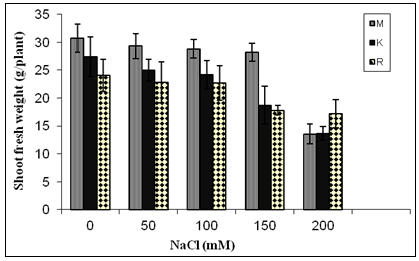Journal of Medicinal Plants and Studies
Volume 2, Issue 1
Physiological and biochemical basis of salt tolerance in Ocimum basilicum L.
Author(s): Saira Khaliq, Zafar ullah zafar, Habib ur Rehman Athar, Rehana Khaliq
Abstract: Globally salinity in the soil is continuously increasing affecting agricultural productivity more than other abiotic factors in arid and semi arid regions and as a result millions of hectares of usable land have now become unsuitable for cultivation. Present study was conducted to test the salt tolerance of three ecotypes of Ocimum basilicum L.by commonly measured physiological and biochemical parameters. Various levels of NaCl salinity stress showed inhibitory effects on roots than shoots growth, predominantly in Rajan pur ecotype. In addition to growth inhibition, NaCl reduced biomass production primarily in the roots. The adverse effect of salinity was also supported by a substantial decrease in total soluble proteins in shoots. In this study, findings indicated that ecotype of Rajan pur was more sensitive under stress than Multan and Khanewal ecotypes. It suggested that Multan ecotype as moderate tolerant could be a better choice for cultivation of salt affected soils which can be of potential importance in sweet basil production so that these plants are easily available in the traditional system of medicines.

Shoot fresh weight (g/plant) of three ecotypes of Ocimum basilicum when four weeks old plants were subjected to varying levels of NaCl salinity stress for further four weeks grown in sand culture in full strength Hoagland’s nutrient solution.
Download Full Article : Click Here